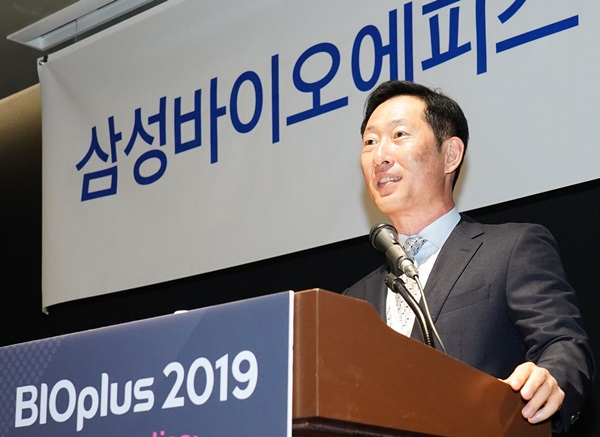Samsung Bioepis said it was confident of achieving 1 trillion won ($855.8 million) global sales of biosimilars this year. The company also expected that it would generate an operating profit for the first time this year in its eight-year history.

Samsung Bioepis CEO Ko Han-sung said the company’s accumulated sales in three quarters this year have already reached the level of the last year’s annual revenue, at a news conference in COEX, southern Seoul, Tuesday. “Supported by the revenue growth, we expect that we would turn from operating loss to operating profit this year,” Ko said.
Ko’s forecast was based on the growth of biosimilar sales in Europe during the first three quarters this year. Samsung Bioepis’ three flagship biosimilars (Benepali, Flixabi, Imraldi) are estimated to have sold $542.4 million (about 650 billion won) in the first nine months of this year.
Combining sales of other products in other countries, the total global annual revenue is likely to exceed 1 trillion won, the company said.
Robust sales of Imraldi, a biosimilar referencing Humira, particularly contributed to the expansion of the total sales.
According to Biogen, the company’s European partner, Imraldi arrived in Europe in October. Its sales steadily grew every quarter to reach $132.3 million in the first three quarters. As of July, Imrali’s market share stood at 14 percent in the adalimumab market in five major European countries.
“Well-established multinational pharmaceuticals and biotech firms had to spend about 20 years on average to achieve 1 trillion won annual sales. I feel proud that Samsung Bioepis, a new firm, did this in a short amount of time,” Ko said. “Thanks to the solid sales, the company had a better footing to demand desired conditions when signing a contract with a partner company, which built trust in Samsung Bioepis’ product development and manufacturing.”
Ko vowed to reduce costs to keep annual sales and operating profit at maximum levels next year. “We are diverting some of the R&D costs for innovation of the process to raise the efficiency in producing authorized products,” he said.
Many biosimilar makers find it tough to enter the U.S. market, but the company anticipates that Imraldi would show fast growth in the U.S. in 2023 when it rolls out the product.
In the U.S., where the bidding system is different from that of Europe, products that bring the most benefit to pharmacy benefit managers (PBM) have been successful, Ko noted. Besides, as there are more original drugs than biosimilars in the U.S., original drugs offered more discounts than biosimilars, he said.
Ko explained that biosimilars that have launched in the U.S. were for hospital use, and they have not provided substantial benefits to PBMs. However, as the original drug Humira will be supplied for pharmacies, Samsung Bioepis’ biosimilar sales could reverse the trend, he said.
“Large PBMs have pharmacies, and a biosimilar of Humira could offer benefits to them. So, our biosimilar is likely to show faster growth than other biosimilars,” Ko added.
He opened a possibility of Samsung Bioepis’ pursuing initial public offering.
“Going public is a good opportunity to raise massive funds, but the company is sufficiently funded without the need for IPO,” he said. “If we need a large-scale fund to make another leap, however, we could pursue it anytime.”

